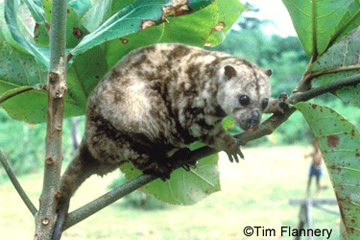Confirmation that Woodlark Island will remain free of palm-oil development
Tropical islanders win battle against palm-oil
Jeremy Hance, mongabay.com
January 16, 2008
Confirmation that Woodlark Island will remain free of palm-oil development
Mongabay has confirmed that the Milne Bay government has pulled plans to allow Vitroplant to log 70% of Woodlark Island for palm oil plantations. The Minister for Agriculture and Livestock, Hon John Hickey, stated in a press release that “Vitroplant did do a feasibility study and were keen to invest on the island. However due to landowner objections on the development of the oil palm industry on the island, the company has decided to pull out.” Vitroplant has yet to comment.
This is considered a victory both for the islanders and the unique ecology of Woodlark Island. In November one-hundred islanders (out of 6,000) traveled to Alotau, the capital of Milne Bay Province, to formally protest the planned deforestation and plantation development. The Woodlark Islanders live off gardening, raising wild pigs, and occasional hunting. Over centuries they have shaped and been shaped by the environment around them. Dr. F.H. Damon in a previous article for Mongabay stated that “there remains on the island something of a unique example of a regional social and ecological system that supported human and other life for 2000 and more years.” If 60,000 hectares of the island had been deforested and turned into a monoculture, there is little question that the Woodlark Islander’s unique way of life would have been changed irrevocably.

The endemic Woodlark Cuscus is safe for now. Photo by Tim Flannery |
In addition to Woodlark Island’s unique culture, the island supports many endemic species. The most well-known is the Woodlark Cuscus, an arboreal marsupial. According to scientists, the island also supports over twenty over endemic species (some so new they have yet to receive names), many of which would have been greatly threatened had 70% of the forest been turned into a plantations. Furthermore, the biologically rich island has not been fully surveyed by scientists and it is probably that many new species await discovery.
The government cited that the reason for the pullout was due to the people’s opposition. But the government may have also felt international pressure. A recent environmental campaign by forests.org sent thousands of opposition e-mails to officials involved in the plans to develop Woodlark Island. As well, a recent article in the London Telegraph called Papua New Guinea an “eco-zero” due to its logging on New Britain island for palm oil, and its proposed logging on Woodlark Island.
Dr. Simon Piyuwes, one of the opposition leaders, stated that the fight for ownership of Woodlark Island is not over: “Woodlark Island is state land since 1916. Our next phase of campaign is to return the island to the islanders.” If the islanders are able to win legal rights to the island then no company would be able to develop any portion of the land without the islander’s assent.













